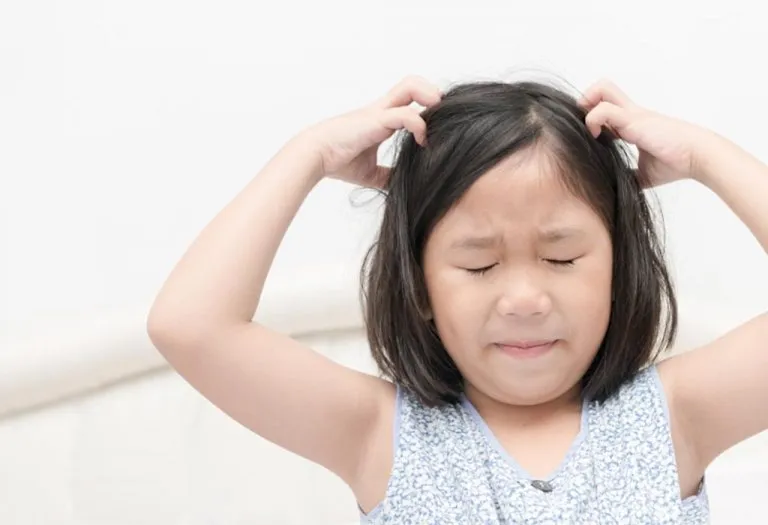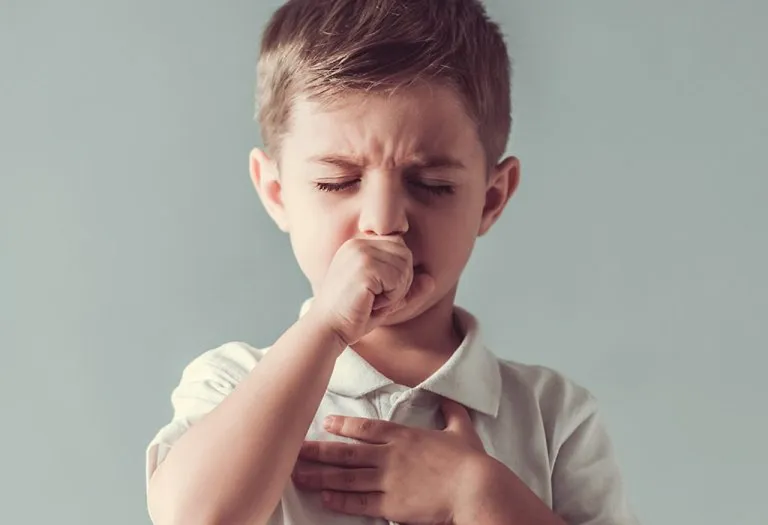Tics in Children – Causes, Signs, and Treatment
Facial grimacing, frequent blinking of an eye, uncontrolled vocalization, sudden headbanging are some tic symptoms that might disturb a parent noticing it. The parent might get shocked to witness such unexpected sounds or movements by their child. Also, the child facing such uncontrollable things might be going through a lot.
In such a scenario, you as a parent start taking unnecessary tension. Tics aren’t that serious most of the time. They have become quite common and, in many children, it comes and vanishes forever within a year.
Do not start panicking very soon. If it is bothering you a lot, talk to some expert. Do not spoil your mental health as well. Remember, a calm parent will solve these things in a much better way! To help you out, we have curated this write-up so that you know the causes, diagnosis, treatment, and how to turn your lifestyle around for a child with tics.
What Are Tics?
Tics are defined as brief, involuntary, stereotyped vocalizations or muscle movements. It produces sudden and difficult to control abrupt body movements. These are repetitive and last for a specific duration. These are common in childhood and usually appear at about 5 years of age. Rarely, it might trigger in adulthood.
The severity of this disease varies from child to child. Tics are generally not very serious, and the severity normalizes over time. It is found that the severity of tics is at a peak at 11-12 years of age and decrease during adolescence. Generally, it disappears after that, but in a few cases, it might re-appear in adulthood. Children who suffer from tics do suffer from some comorbidities as well.
Maybe tics are not that serious, but when it hinders your day-to-day activities, it might frustrate you. Let us now learn about this disease in depth!
Types of Tics
Tics are generally classified as either motor or phonic and simple or complex. These types can be explained as:
- Motor Tics: The tics that affect your body movement are called motor tics.
- Phonic Or Vocal Tics: Involuntary sound produced by mouth, nose, or throat. They are also called vocal or verbal tics.
- Simple Motor Tics: They are brief, meaningless, involuntary movements that involve only a single group of muscles like head jerking, eye blinking, or shoulder shrugging.
- Simple Phonic Tics: These can be any noise or sound, with usual vocal tics like sniffing, throat clearing, or grunting.
- Complex Motor Tics: These remain for a longer duration and have a purposeful appearance. They have movement clusters and appear coordinated.
- Complex Phonic Tics: Some examples of this are ‘repetition of words just spoken by someone else’ and ‘repeating things already told by self.’ In more severe cases, the breathing pattern alters, leading to a breathing tics child.
Some Examples of Tics Are:
- Banging or jerking of the head
- Wrinkling, blinking the nose or grimacing
- Touching people or their things
- Clicking the fingers
- Sniffing, grunting, or coughing
- Repetition of a phrase or sound
What Causes Tics in Children
There is no particular cause of tics in children. Multiple factors contribute to tics. According to researchers, a combination of biological and environmental factors can create tic in a child. Following are some known factors that might contribute to tic:
- Environmental factors like coming in contact with chemicals, especially those found in cleaning products, allergens, etc., might cause a tic. A violent scene in a video game or movie can also trigger a tic.
- Some researchers also believe that tics can be genetic.
- Some researchers also say it can trigger brain or neurotransmitters abnormalities and cause nervous tics in children.
- Certain comorbidities can also cause tics. These are body toxins, stroke, surgery, head trauma, or infection.
- Certain neurodegenerative conditions like neuroacanthocytosis, Huntington’s disease, and Creutzfeldt-Jakob can also lead to the development of tics in children.
Some Other Factors That Cause Tic Syndrome Are:
- Complications during birth
- Low birth weight
- Smoking or consumption of alcohol during pregnancy by the mother
- The child had suffered from group A ß-hemolytic strep (streptococcal) infection
Signs and Symptoms of Tics in Children
Tics are sounds or movements that cannot be controlled by the child.
The Symptoms of Motor Tics Are:
- Frowning
- Blinking
- Biting lip
- Shrugging of shoulders
Some Vocal Tics Are:
- Humming
- Sniffing
- Throat clearing
- Snorting
- Squealing
Few children experience discomfort before a tic. This is termed as ‘premonitory urge’ and gets relieved just after the tic gets over.
Diagnosis of Tics in Children
Diagnosing tics can be difficult. It is because a few of its symptoms, like throat clearing or nose twitching, look normal. Or else such symptoms can also occur due to an allergic reaction. So, for tics, there should be a comprehensive physical and neurological diagnosis. After that, the doctor should study the child’s complete medical history to determine the cause behind tics.
The Diagnosis Involves the Following Steps:
- Determination of tics symptoms manifestation. Ideally, the child’s age for tics onset should be less than 18.
- Severity of tics
- Duration for tics take place
- Type of tics
Here is how the type is diagnosed and explained. If the child has short-lived motor or vocal tics for a month but less than a year, it is termed transient tic syndrome. If your motor or vocal tics last long and you have been experiencing them for more than a year, the tic is called chronic tic disorder.
Tourette Syndrome is a nervous system disorder that involves tics. It is the persistence of both vocal and motor tics for more than a year.
Treatment for Tics

Generally, tics do not require treatment until it starts to affect the child’s daily activities. Also, if tics become severe, they require treatment. The treatment options include:
1. Treating Underlying Medical Condition
If in the diagnosis, it appears that an underlying medical condition is responsible for tics. Then treatment of that condition will lead to the elimination of tics. Few homeopathic remedies work on tics. But it will be great if the trigger is identified and is removed or at least minimized.
2. Cognitive Behavioral Therapy
This is the aptest way to treat a confirmed tic case. First, the doctor finds out the emotion that triggers a tic. Once the triggering emotion is identified, the doctor trains the child’s brain to learn a lesser evident motor reaction. It is called habit reversal training.
For example, if the child experiences facial tics like grimacing or eye blinking, the doctor will make him unlearn it. And replace it with asking the child to take deep breathing or close the eyes for a few seconds. These techniques will, in turn, calm down the child. Possibly it might reduce tics in children.
3. Medication
Sometimes the ultimate resort to treat tics is medication. Depending on the cause of tics, the doctor might prescribe you medicines like:
- Antipsychotics or neuroleptics like risperidone, pimozide, and aripiprazole are the prime medication used for treating tics in children. These medicines alter the chemicals that control muscular movement. However, these medicines have serious side effects like weight gain, blurred vision, dry mouth, and constipation.
- Botulinum toxin relaxes particular muscles and leads to tics prevention. But its effect remains for three months.
- Another medicine that alters chemical production in the brain and reduces the frequency and severity of tics is Clonazepam.
- Clonidine also reduces the symptoms of tics.
Note: All these medications have side effects. Always consult a doctor before use.
Home Remedies to Treat Tics in a Child
Often, sudden onset of tics in children can be managed without treatment or medication. Always remember the child will not pretend a tic. Tics are involuntary muscular movements or vocalizations. If, as a parent, you start taking it normally, the problem minimizes in itself. The child also gets some confidence to fight it out. In case if you start over-reacting or getting angry over it, the situation might get worse.
Here Are Some Tips That Help In Dealing With Tics At Home:
- The most common triggers to tics are anxiety and stress. You can try and keep the child in a stress-free environment.
- Ten hours of sleep is recommended for children with tics. Make them rest well at night.
- Sometimes tics trigger due to a food allergy. In such a case, get your child tested for food allergies. Talk to the doctor about it. Avoid food with artificial flavors, colors, or preservatives. Avoid dairy products, corn syrups, and processed foods. Switch to a gluten-free diet and look for the difference.
- If the tics aren’t very serious, please ignore them. Do not unnecessarily take the stress and give it to the child as well.
- Tics are embarrassing for the child. Keep counseling your child for mental well-being.
- There is a certain link between tic syndrome and ADHD. A study suggests that most ADHD patients suffer from magnesium deficiency. Hence, give your child magnesium-rich food. You can also try giving some magnesium supplements to the child.
How Are Tics Related to Tourette Syndrome?
In a few cases, Tourette Syndrome is mistaken to be a chronic tic. But it is more severe than the chronic tic. It is because children with Tourette Syndrome experience both vocal and motor tics.
A child suffering from this syndrome sometimes has multiple tics happening at a time. These tics might run throughout the day. The only good thing here is, if the person is completely focused on work or is relaxing, the tic might not happen at all. Also, the severity of this syndrome generally changes over time. Tic frequency might reduce, but the severity might increase. It is observed in many people that the patient’s condition improves as they grow older.
Tourette Syndrome is often related to other conditions like OCD, ADHD, or trouble learning. It usually starts in children between the age group of 5 to 18 years.
When to See a Doctor?
The most frequently asked question by parents whose children suffer from tics is:
when to worry about childhood tics? With a child being at home, pediatrician visits are quite frequent. It might be a normal flu or a routine vaccination, but you do visit a pediatrician very often. SO, if you predict some tics in your child, there is no harm in discussing with your doc!
Remember, tics aren’t very serious, though. If tics are mild and do not cause any harm, you need not bother about those. Sometimes, the tics might disappear completely.
A Doctor’s Consultation Is Required When the Tics:
- Cause social or emotional issues, like bullying, embarrassment, or social isolation
- Become a regular affair and very severe
- Cause some physical changes. It is because a bad mental state starts giving physical signs like stomach aches, headaches, and sleepiness.
- Start to cause behavioral and personality changes in your child. Supposedly your child was a social animal before and now has become reserved suddenly.
- Interfere with day-to-day activities
- Cause discomfort or pain like accidentally hurting themselves
- Come with excessive depression, anger, or self-harm
Tics are usually mild and can be easily treated at home. Remember, if it is not bothering your child, it should not bother you as well. Kids with tics desire to be treated like normal kids. Try doing that. Be normal in front of them. Do not over-react. These kids are completely normal and can-do normal things just like any other child of their age. Tics don’t make them less intelligent. A positive environment, good lifestyle, and healthy diet can keep the child relaxed and healthy and minimize treatment requirements. Keep noting the patterns when tics occur. This might help the doctor diagnose things only if the need arises!
Also Read:
Mental Disorders in Kids
Causes of Dyslexia in Children
Absence Seizures in Kids
















